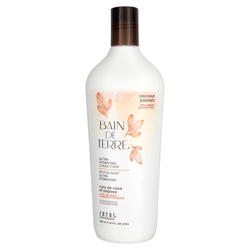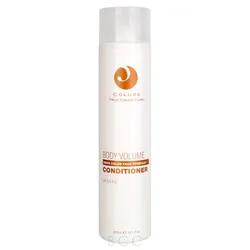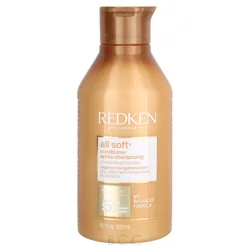Choosing the Right Conditioner
Technically, a hair conditioner is a hair care product, which alters the texture and appearance of human hair. Conditioners are used to give the hair extra care and nourishment, especially after a thorough shampooing. The primary function of a conditioner is to replace the sebum, which is lost from the hair after shampooing. For decades, natural oils have been used to condition human hair. These oils are used still in use today and include essential oils like tea tree oil and carrier oils such as jojoba.
FUN FACT
Macassar oil was a popular conditioner in the late Victorian era, however it was quite greasy and required pinning a small cloth, called as antimacassar, to chairs and sofas to protect the upholstery from being damaged by the greasy Macassar oil. Modern hair conditioner was formulated and developed at the turn of century, when a renowned perfumer Ed. Pinaud presented a product that he called brilliantine at the 1900 Exposition Universelle in Paris. The product was formulated to soften men's hair.
Technical
Conditioners are generally acidic, as low pH adds a proton to a molecule of the amino acids, which in turn provides positive charge to hair and as a result more hydrogen bonds between the keratin scales which gives the hair a more compact structure. Conditioners are generally formulated using organic acids like citric acid to maintain acidity.
So, what type of conditioner should you use?
- Fine, flat hair.
Use volumizing conditioner on fine, flat hair. If you have straight, silky hair with no frizzing problems, you want a conditioner that's going to add some much-needed texture to hair that might otherwise seem to just hang from your head. Volumizing conditioner is lighter than a regular formula, and doesn't add extra weight to hair when used regularly. People with fine, flat hair should never use smoothing conditioners; these heavy products will make your hair hang even more flatly.
- Wavy Hair.
Look for a light-weight moisturizing conditioner. Wavy hair can be hard to work with "” in humid weather it can frizz out of control, and in dry weather it can grow limp. The more curl there is in a strand of hair, the dryer the end of the strand gets, because it's hard for the natural oils from the scalp to wind their way down a curled strand than a straight one. Although wavy hair doesn't tend to be as dry as curly hair, you still need a moisturizing conditioner to stand in for those oils that aren't making their way down to the tips of your hair. Just be sure it is a lightweight moisture and apply mostly to the ends of hair.
-
Thick, Curly Hair.
You need deep-hydrating conditioner. The curlier the hair, the dryer it gets. If you have thick, curly hair, odds are that without a deep-hydrating conditioner to make up for the lack of oils making their way from the scalp to the tip of the strand, you'll have dry, dull hair with a tendency to frizz. Look for conditioners labeled as "deep hydrating" or for curly hair specifically. You should also consider using a leave-in conditioning mask on a weekly or bi-weekly basis. These conditioners are meant to be left in your hair for 10-15 minutes, then washed out like regular conditioner. With regular use, you should see a significant change in the way your curls hold together rather than frizzing away.
-
African-American Hair.
Protect the intense curl with a deep-hydrating conditioner or oil-based products. The right conditioning product can make even the curliest hair shiny and healthy. Products with shea butter or various types of oils "” from coconut oil to the more expensive Moroccan argan oil "” are a good bet.
-
Dyed Hair.
Use color-safe or color-depositing conditioner if you dye your hair. As time passes after your initial dye application, you'll notice that the dye in your hair will get washed away by your showers. To keep the color vibrant for as long as possible, you'll want to choose an appropriate conditioner. It's the water, not the conditioner, that washes the dye from your hair when you shower. However, color-safe conditioners seal hair cuticles, allowing your hair to hold onto the dye for a longer period of time. Look for packaging that advertises products as "color safe," "color extend," "color care," or "sulfate-free."
Color-depositing conditioners actually deposits a small amount of color each time it's applied in the shower, not only maintaining the richness of the original color, but also hiding the roots that emerge as your hair grows out for a period of time.
- Dandruff. Use a light, fragrance-free conditioner. Dandruff is a scalp issue, not a hair issue; the skin on your scalp grows and dies at a faster rate than in people without dandruff, leaving an embarrassing flaky white residue in your hair and on your shoulders. The shampoo you choose will have more of an effect on your dandruff than your conditioner, but there are still many products on the market geared toward treating this condition. Look for lighter conditioners rather than high-moisturizing or oil-heavy ones that can contribute to the problem on your scalp. Hair products with heavy fragrances often irritate the scalp, which leads to more itching, and more evidence of your dandruff on your clothes. Avoid heavily perfumed conditioners.
The Bottom Line:
Think about your hair, how you are feeling, what you are eating and any medications you are taking when choosing your hair conditioner. All of these can affect the look and feel of your hair. Sometimes it's best to alternate conditioners and sometimes it's best to skip the conditioner altogether! Think about conditioning before shampooing or co-pooing. You know your hair best. There are so many options available.




 write a review
write a review